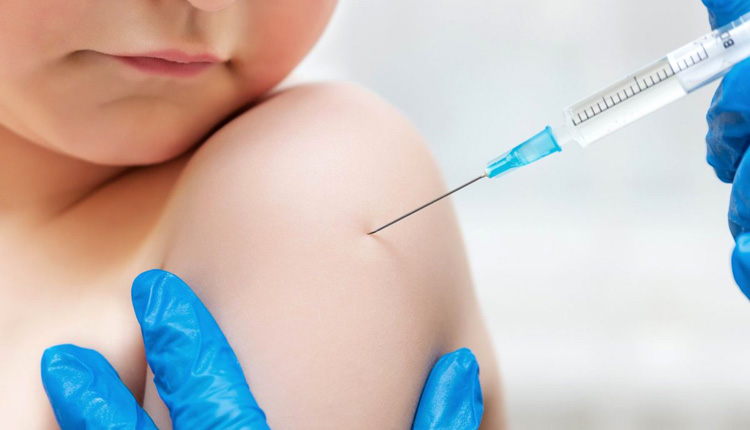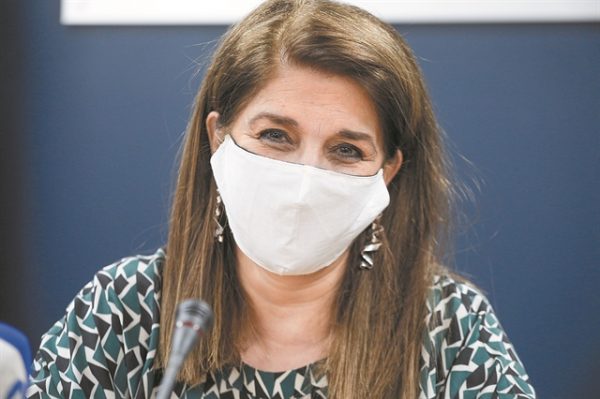
The new chapter of the “Freedom” campaign will be implemented from tomorrow for the voluntary vaccination of adolescents aged 15-17, after the necessary consent of the parents.
The professor of Pediatric Infectious Diseases, member of the Committee of Experts and the National Vaccination Committee, Vana Papaevangelou, analyzes in an interview with “NEA” newspaper all the latest data and the catalytic role of the Delta mutation that led to this decision.
Are Vaccines Safe for Teenagers? Cases of myocarditis and pericarditis are of concern to some parents. What do you advise them?
Today we can answer this question with more certainty. A few weeks ago, the FDA and EMA then approved the vaccination of adolescents aged 12-17 years based on a clinical study (Frenck RW et al. NEJM 2021) involving approximately 2,500 adolescents. At that time, the National Vaccination Committee (NSC) reserved the right to suggest the start of vaccination of adolescents in our country in order to have more data from the application of vaccinations in clinical practice. Today, 6 million adolescents have been vaccinated in the United States alone, and many other countries have begun vaccinating adolescents, such as Canada, Israel, and Germany. It is becoming clear that the EU, responding to the new challenges of the pandemic, always suggests that the main focus is on the safety of the population, carefully reviewing the epidemiological data and the substantiated scientific knowledge.
On June 23, the U.S. Vaccination Committee (ACIP) reviewed all safety data from Pfizer vaccine in adolescents 12-15 years of age (6 million doses) and compared it with data from adverse reactions in young adults 16-25 years of age. (total 21.6 million installments). Both local (edema, pain at the injection site) and systemic side effects (headache, nausea, vomiting, dizziness) were similar in both age groups. Regarding the cases of myo-pericarditis that have been reported after vaccination with the coronavirus vaccine, they report that it is an extremely rare complication (estimated to affect about 18 cases / 1 million vaccinated) that has a mild and self-limiting character. It occurs mainly in males aged 16-24 years usually 4-7 days after the 2nd dose of the vaccine.
What is the recent decision of the National Vaccination Committe, for the vaccination of 15-17 year olds, based on?
Primarily on the expected benefit to the teens themselves. Although we know that children get sick less often than adults and that most of them have a mild illness, a recent US publication showed that 12-17 year olds are 2.5-3 times more likely to be hospitalized for coronavirus compared to the common flu. Three in 10 adolescents needed ICU admission. In fact, these data refer to the first months of 2021, when the restrictive measures were in force in the USA, ie the schools were often closed and everyone complied with the personal protection measures (mask, distances, and hand hygiene). This means that the morbidity of adolescents from coronavirus is significantly higher than that of seasonal flu.
We also considered the role of adolescents in transmitting the virus and spreading it in the community. We know that teenagers transmit much more than younger children, but also that they show significantly more mobility and more social contacts. Finally, we took into account the importance for these ages for the smooth educational process during the next school year.
Is vaccination contraindicated in adolescents with health problems – e.g. allergies?
The same goes for teenagers as for adults. Only people with a known allergy to polyethylene glycol (PEG) or polysorbate are contraindicated. PEG is a component of various cosmetics and laxatives administered before digestive tract endoscopies. A previous history of allergy to inhaled allergens, food or medicine has not been associated with COVID-19 vaccination rash. Adolescents with underlying diseases should be vaccinated as a matter of priority for their personal protection.
What will apply to adolescents 12 years of age and older with chronic illness? Who are considered high risk individuals?
According to a recent US study, of the approximately 200 adolescents 12-17 years of age who needed to be treated for COVID-19 infection, 7 out of 10 had an underlying disease. The most common underlying diseases included obesity, chronic respiratory diseases (such as asthma) but also chronic neurological diseases. The EUSR examines the morbidity data of adolescents from both the international literature and the data in our country, in order to suggest which adolescents 12-15 years old should not be vaccinated due to an underlying disease.
More and more scientists around the world describe the child population as “unprotected”, as it is unvaccinated. What is your opinion after the confluence in kindergartens and camps? Is the Delta mutation a danger to children?
The Delta mutant is known to be a highly contagious strain of the virus that has the potential to spread rapidly and efficiently, causing outbreaks. We do not yet have documented data regarding the morbidity of patients (children and adults) with Delta mutation. In other words, we do not know whether patients with Delta mutation will present with a milder or more severe clinical picture.
But it makes sense that, as the proportion of adults vaccinated increases, children and adolescents will make up a significant proportion of the vulnerable population. Recent data from Israel, where a large proportion of adults have been vaccinated, show that 52% of new cases are in people under 19 years of age.
Latest News

WTTC: Travel & Tourism to Create 4.5M New Jobs in EU by 2035
This year, international visitor spending is set to reach 573 billion euros, up by more than 11% year-on-year

IMF: US Tariffs Shake Global Economy, Outlook Downbeat
IMF slashes global growth forecast to 2.8% as U.S. tariffs create uncertainty and ‘negative supply shock

First Step Towards New Audiovisual Industry Hub in Drama
The project is set to contribute to the further development of Greece’s film industry and establish Drama as an audiovisual hub in the region

Airbnb Greece – Initial CoS Ruling Deems Tax Circular Unlawful
The case reached the Council of State following annulment applications filed by the Panhellenic Federation of Property Owners (POMIDA)

Mitsotakis Unveils €1 Billion Plan for Housing, Pensioners, Public investments
Greek Prime Minister Kyriakos Mitsotakis has announced a new set of economic support measures, worth 1 billion euros, aiming to provide financial relief to citizens.

Alter Ego Ventures Invests in Pioneering Gaming Company ‘Couch Heroes’
Alter Ego Ventures' participation in the share capital of Couch Heroes marks yet another investment by the Alter Ego Media Group in innovative companies with a focus on technology.

Corruption Still Plagues Greece’s Driving Tests
While traffic accidents continue to claim lives on Greek roads daily, irregularities and under-the-table dealings in the training and testing of new drivers remain disturbingly widespread

Pope Francis Died of Stroke and Heart Failure Vatican Confirms
As news of the official cause of death spread, tributes poured in from across the globe. The 1.4 billion-member Catholic Church is united in grief, remembering a pope who championed inclusion, justice, and compassion

Increase in Both Museum Visits, Revenues for 2024
As expected, the Acropolis was the top archeological site in the country, followed by Sounion, Mycenae, the ancient theater of Epidaurus, and Vergina in northern Greece

Where Greece’s Tourists Come From: A Look at 2025’s Top Visitor Markets
The United Kingdom continues to hold the top spot as the largest source of incoming tourism, with 5.6 million seats booked for Greece this summer — up 2.2% from last year. This accounts for 20% of all international air traffic to Greece

















![Ξενοδοχεία: Μεγάλο το ενδιαφέρον για επενδύσεις στην Ελλάδα – Η θέση της Αθήνας [γραφήματα]](https://www.ot.gr/wp-content/uploads/2025/03/Athens-hotels-90x90.jpg)
























 Αριθμός Πιστοποίησης
Αριθμός Πιστοποίησης